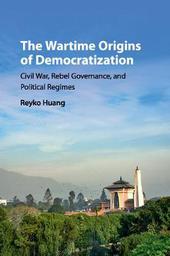
|
The Wartime Origins of Democratization: Civil War, Rebel Governance, and Political Regimes
Paperback / softback
Main Details
| Title |
The Wartime Origins of Democratization: Civil War, Rebel Governance, and Political Regimes
|
| Authors and Contributors |
By (author) Reyko Huang
|
| Series | Problems of International Politics |
|---|
| Physical Properties |
| Format:Paperback / softback | | Pages:242 | | Dimensions(mm): Height 228,Width 152 |
|
| Category/Genre | Military history |
|---|
| ISBN/Barcode |
9781316617717
|
| Classifications | Dewey:321.809 |
|---|
| Audience | | Professional & Vocational | |
|---|
| Illustrations |
14 Tables, black and white; 8 Line drawings, color; 2 Line drawings, black and white
|
|
Publishing Details |
| Publisher |
Cambridge University Press
|
| Imprint |
Cambridge University Press
|
| Publication Date |
17 August 2017 |
| Publication Country |
United Kingdom
|
Description
Why do some countries emerge from civil war more democratic than when they entered into it, while others remain staunchly autocratic? Observers widely depict internal conflict as a pathway to autocracy or state failure, but in fact there is variation in post-civil war regimes. Conventional accounts focus on war outcomes and international peacebuilding, but Huang suggests that postwar regimes have wartime origins, notably in how rebel groups interact with ordinary people as part of war-making. War can have mobilizing effects when rebels engage extensively with civilian populations, catalyzing a bottom-up force for change toward greater political rights. Politics after civil war does not emerge from a blank slate, but reflects the war's institutional and social legacies. The Wartime Origins of Democratization explores these ideas through an original dataset of rebel governance and rigorous comparative case analysis. The findings have far-reaching implications for understanding wartime political orders, statebuilding, and international peacebuilding.
Author Biography
Reyko Huang is an Assistant Professor at the Bush School of Government and Public Service at Texas A & M University.
Reviews'This book is a model piece of scholarship in political science. It is eloquently written. It addresses an enormously important topic in global politics and offers nonobvious arguments constructed upon an impressive foundation of original and systematic empirical evidence. It will appeal greatly to scholars of international relations as well as comparative politics, and should offer lessons to policy practitioners and scholars alike.' Dan Slater, University of Chicago 'This imaginative and highly readable book focuses attention on how rebel engagement with non-combatants in wartime shapes post-war political outcomes. While the problem of the breakdown of institutions and the plights of non-combatants have consumed the attention of policy makers for several decades, the connection between rebel governance and post-war political order merits equal public concern. This book makes significant theoretical advances as it links concerns about rebel governance with larger questions about the impacts of civil wars on post-war politics. Huang provides a refreshingly new way to bring together advances in the study of civil wars with enduring concerns about the nature of political development. This is an enlightening book that deserves a wide audience.' William Reno, Northwestern University 'A fruitful crossing of subfield boundaries and a provocative and well-written analysis of how civil war sometimes leads to democratization.' Nancy Bermeo, Nuffield Professor of Comparative Politics, University of Oxford
|